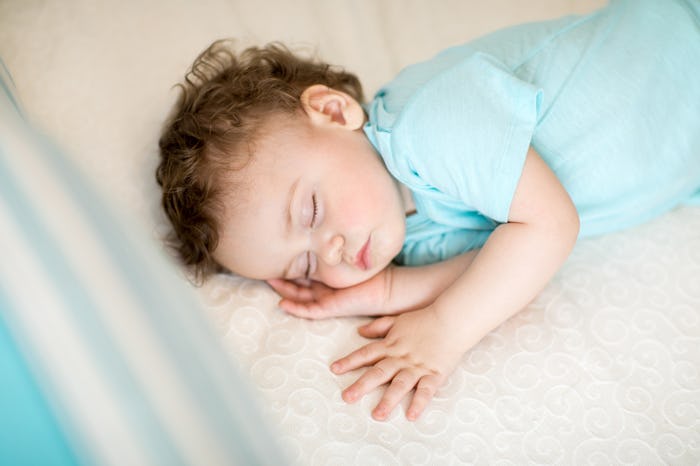Life

Day Care *Can* Affect Your Baby's Sleep Habits, But It's Not Always Negative
Infant sleep is probably among the most consuming parts of early parenthood. After all, if your baby is not sleeping, neither are you. As soon as you have things figured out, something changes. Whether it's a cold, a developmental leap, cutting teeth, or starting something new, little things can affect your baby's sleep in big ways. So, if you're getting ready to send your little one to day care, you're probably wondering how it will impact them beyond the social aspect. Like does day care affect your baby's sleep habits?
The short answer is, yes, day care affects your baby's sleep habits, according to The Baby Sleep Site. Some babies end up sleeping better at day care than at home, usually due to the extremely consistent schedules and routines in place at child care centers. But other babies may sleep significantly worse at day care than at home, typically due to the differences in environment. So your child might go one way or the other, or, if they are super flexible, they could transition really well and sleep generally the same at both home and school.
Obviously, this depends a lot on your baby's personality, preferences, and temperament, and it's really hard to tell what the transition to day care will be like for your kid until you actually go through it.
As Nicole Johnson, owner of The Baby Sleep Site, tells Romper, every day care seems to have a different set of rules regarding sleep — some of the bigger franchise-type places may have more formal policies, but even then, every director and every teacher in each center may approach sleep differently. "Typically," she says, "what happens is that when your baby is under 1 year old, many daycares are more flexible and will follow the baby’s cues as far as sleep schedule goes, but once they are around 12 months old, they are expected to follow a more clock-based routine and schedule."
If you tend to be loose with your baby's schedules at home, or your baby is used to napping on the go, you might find that the consistency and routine of day care actually makes her sleep better. As The Baby Sleep Site noted, babies also tend to pick up quickly on the expectations of their caregivers — if your little one's teachers are consistent about their expectations, your baby will probably fall into a good sleeping pattern without fuss. Since, as parents, we tend to cuddle and coddle and give in, our kids learn quickly what exactly they can get away with at home.
Peer pressure might also play a role in your little one sleeping better at day care than home. Riki Taubenblat, certified sleep consultant from Baby Sleep Maven, tells Romper, "The advantage of being in a group child care setting is that even the most difficult nappers will succumb to the mass mentality of all their little friends laying down on yoga mats with the lights off. Parents often tell me their toddler won't nap at home but naps beautifully while they're in day care."
If you want your little one to sleep at home the way she sleeps at day care, talk to the teachers about the routines in place in the classroom and try to replicate it at home. Maybe your baby sleeps in a dark, quiet room at home, but prefers the natural hustle and bustle of daytime. Making a simple switch can help you stay consistent between home and school.
Or your child might not prefer that light and noise, and have a hard time sleeping well at day care. If he is not getting enough daytime sleep, this could, in turn, have an affect on his nighttime sleep. As Parents mentioned, being exhausted from a long, restless day can actually make it harder for your baby to fall asleep and stay asleep at night. And, being consistently overtired makes it easy for your baby to fall into a pattern of bad sleep.
If this is the case for your little one, try talking with your little one's teachers regarding how you make sleep work for you at home. They may be able to alter a few things that make a big difference — like putting on a lullaby CD, or moving your baby's sleep spot to a darker area. Your day care provider should be willing to work with you within reason. After all, if they can help your baby sleep better during the day, that offers them a break, too.
Having your child in day care requires a shift in parenting — you and your baby will learn to be a little more flexible, and also how to work with your day care providers as a team. Working in a partnership with your child's caretakers can help provide consistency and routine for your little one. And hopefully, this results in better sleep for everyone.
Check out Romper's new video series, Bearing The Motherload, where disagreeing parents from different sides of an issue sit down with a mediator and talk about how to support (and not judge) each other’s parenting perspectives. New episodes air Mondays on Facebook.